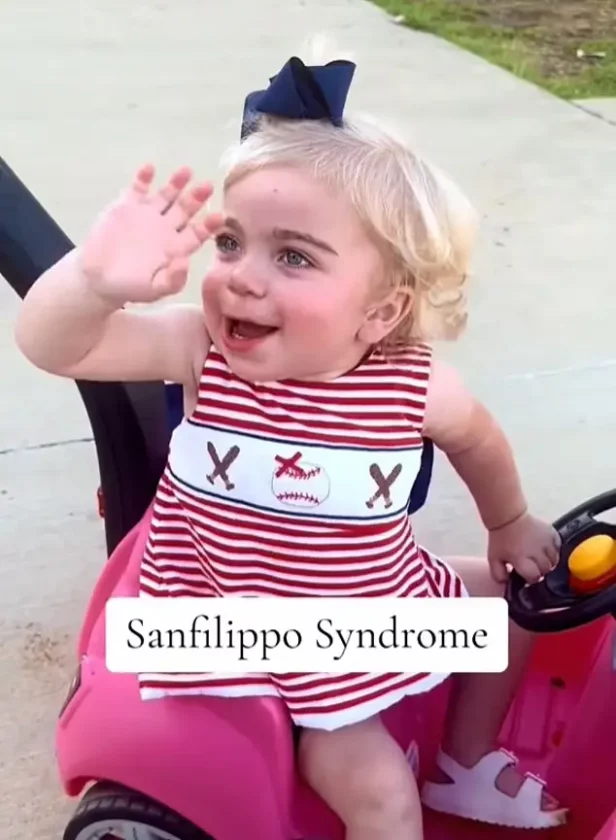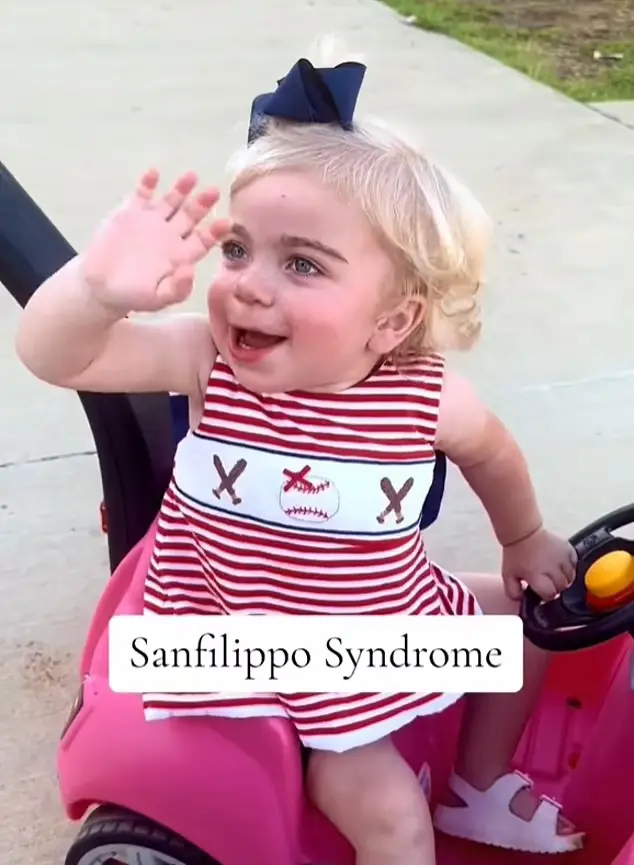Morgan Rachal’s maternal instincts led to the early diagnosis of her daughter Lydia’s rare ‘childhood dementia,’ Sanfilippo syndrome. The disease, often misdiagnosed as ADHD or autism, has no cure, but emerging gene therapies offer hope.
Louisiana, Bollywood Fever: A Louisiana mother, Morgan Rachal, attributes her “mom gut” to diagnosing her toddler, Lydia, with the rare and devastating disease known as ‘childhood dementia.’
Lydia was born in October 2022, and her mother noticed her newborn had defined eyebrows that thickened over the next few months. While others remarked that Lydia looked “just like her daddy,” Mrs. Rachal initially didn’t think much of it.

The turning point came when Mrs. Rachal’s mother sent her a TikTok video of a little girl with Sanfilippo syndrome, a rare disease, who bore a striking resemblance to Lydia. “I looked at it and I just saw Lydia’s face in this child,” Mrs. Rachal said.
Acting on her instincts, the emergency room nurse urged doctors to conduct genetic tests on Lydia in March. At just 18 months old, Lydia was diagnosed with Sanfilippo syndrome, a genetic disease affecting about 5,000 Americans and causing dementia-like symptoms in children, such as loss of speech, mobility, and cognitive skills. It impacts approximately one in 70,000 births annually, with most sufferers deteriorating around age four and rarely living past their early teens.
Mrs. Rachal shared her heartbreak on Facebook a month after the diagnosis: “Thirty days ago was the worst day of my life so far. Though I still had her existence, my heart shattered as if I had lost her. I only lost the life I planned for her. The dance recitals, her childhood, softball tournaments with her sister, proms, wedding, watching her become a mom. We all have this ‘what it’s supposed to look like’ outlook in life. When really, we never know when their health will change, or when God decides to take them home with him.”
In addition to coping with her own and her husband Kirk Rachal’s emotions, Mrs. Rachal expressed the difficulty of eventually explaining Lydia’s terminal illness to her older daughter, Heidi. Despite the challenges, the sisters share a close bond.
A supportive online community of parents with children affected by Sanfilippo syndrome led Mrs. Rachal to push for genetic testing. Although her doctor was initially unaware of the condition, genetic specialists in New Orleans confirmed Lydia’s diagnosis early enough to prevent brain damage.

Sanfilippo syndrome is caused by a lack of an enzyme that breaks down certain waste products in the body, leading to toxic levels in the brain. Symptoms include distinctive eyebrows, mild speech delays, hyperactivity, irritability, coarse and excess hair growth, coarse facial features, severe sleeping problems, respiratory infections, ear infections, digestive issues, and an unsteady gait. Mrs. Rachal noted that Lydia experienced recurrent constipation, multiple ear infections, and sleep disturbances.
Due to its behavioral symptoms, Sanfilippo syndrome is often misdiagnosed as ADHD or autism. “It’s so rare that a lot of moms have told me their child was first diagnosed with autism because that’s how it presents,” Mrs. Rachal told People.
There are four subtypes of Sanfilippo syndrome based on the missing or defective enzyme, with MPS IIIA being the most common and severe. Lydia was diagnosed with MPS IIIB, a less common form that progresses more slowly.
Currently, there is no cure for Sanfilippo syndrome, but research and clinical trials for enzyme replacements are underway. Mrs. Rachal recently shared an update on Facebook that the FDA has determined gene therapy could be effective for Sanfilippo syndrome. Ultragenyx Pharmaceutical plans to file for approval for its gene therapy by the end of 2024 after working with the FDA for accelerated review. Early trials showed stability or cognitive gains in 16 of 17 participants.
Additionally, a 2023 study funded by Orchard Therapeutics from Manchester University NHS Foundation Trust found that four of five patients with Sanfilippo continued to gain cognitive skills on par with healthy children after receiving investigational gene therapy.
Details about the cost, availability, and insurance coverage for these therapies are still unknown.
Also Read, Eight-Year-Old Girl Dies After Medical Emergency on Flight to Chicago
Supreme Court Rules Against Reimbursement for Bankruptcy Fee Disparity
Louisiana Man Arrested in Connection with Triple Tragedy and Possible Human Trafficking Case
